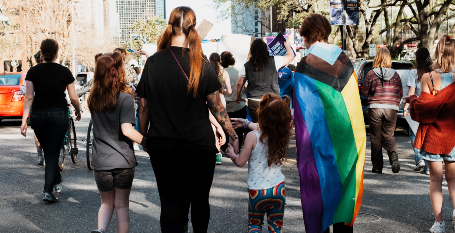The children of same-sex couples fare just as well, if not better, than those of heterosexual couples, research has shown.
While data on so-called “sexual minority families” is limited, the UK’s Office for National Statistics recorded 212,000 same-sex families in the UK in 2019, a 40% rise since 2015. The number of same-sex parents rose from 4,000 in 2010 to 12,000 in 2013.
A new study backs up previous research, concluding that a child’s development has little to do with their parents’ sexual orientation or gender identity.
“Contrary to many concerns, our review found most family outcomes were similar between these two family types, and sexual minority families have even better outcomes in some domains, such as child psychological adjustment and child-parent relationships,” the researchers wrote.
The findings chime with several other studies, including three decades of research from Australia that revealed children raised by same-sex parents do as well emotionally, socially and educationally as their peers in heterosexual families.
The latest study, published in the journal BMJ Global Health by researchers in the US and China, is based on analysis of 34 studies from countries where same-sex relationships are legal, including the US, UK and parts of Europe. These studies compared the development of children raised by heterosexual parents with those brought up by lesbian and gay parents – and some studies also included the families of bisexual, queer or transgender parents.
The team analysed data from 16 of the studies and found that sexual minority parents reported significantly fewer psychological problems among preschool-age children than heterosexual parents, although no difference was found among older, school-age children.
While family functioning, couple relationship satisfaction, parental mental health and parenting stress showed no differences based on parents’ sexual orientation, in some areas sexual minority families appear to fare better.
“Sexual minority parent groups showed higher levels of parent-child relationship quality, such as higher levels of warmth, greater amounts of interaction and more supportive behaviour, when compared with the heterosexual parent groups,” the researchers wrote.
Dr Rachel Farr, an expert in LGBTQ+ parent families at the University of Kentucky, who was not involved with the work, raised concerns that the study took into account controversial or even discredited research – including a study that suggested having same-sex parents increases the likelihood of negative social, emotional and relational outcomes.
Deni Mazrekaj, an assistant professor of sociology at Utrecht University, also raised concerns, noting that some research included in the study had been misinterpreted as suggesting children from same-sex families had poorer academic performance, while other pertinent research had not been included.
However, Farr said the review’s conclusions reflected the findings of a large body of research. “The general message is the same,” she said. “The sexual orientation and gender identity of parents are far less important to children’s outcomes and development as compared to what happens within families, such as the quality of parenting and family relationships.”
Reporting by The Guardian has highlighted a new study that confirms that the children of same-sex couples fare just as well, if not better, than those of heterosexual couples, research has shown.
The research concludes that a child’s development has little to do with their parents’ sexual orientation or gender identity. Additionally, the research indicated that children with same-sex parents have better outcomes in terms of psychological adjustment and child-parent relationships.
This latest study - published in the journal BMJ Global Health by researchers in the US and China - is consistent with previous research that has indicated that children raised by same-sex parents do as well emotionally, socially and educationally as their peers in heterosexual families.
When looking at child-parent relationships, the research found that same-sex parents are likely to offer higher levels of warmth, greater amounts of interaction and more supportive behaviour, when compared with the heterosexual parent groups.
What this indicates is that the sexual orientation and gender identity of parents is far less important to children’s outcomes and development as compared to what happens within families, such as the quality of parenting and family relationships.

